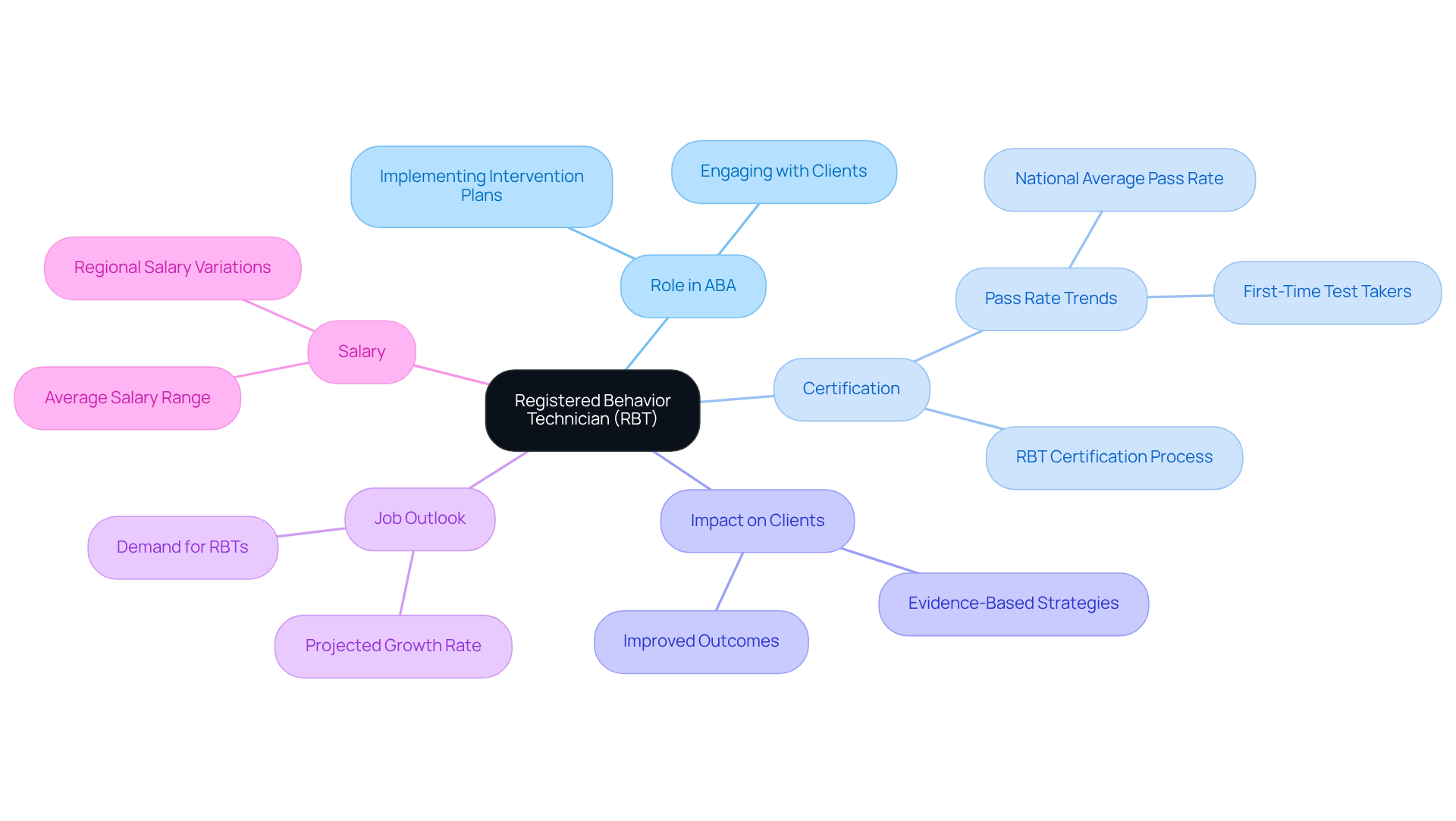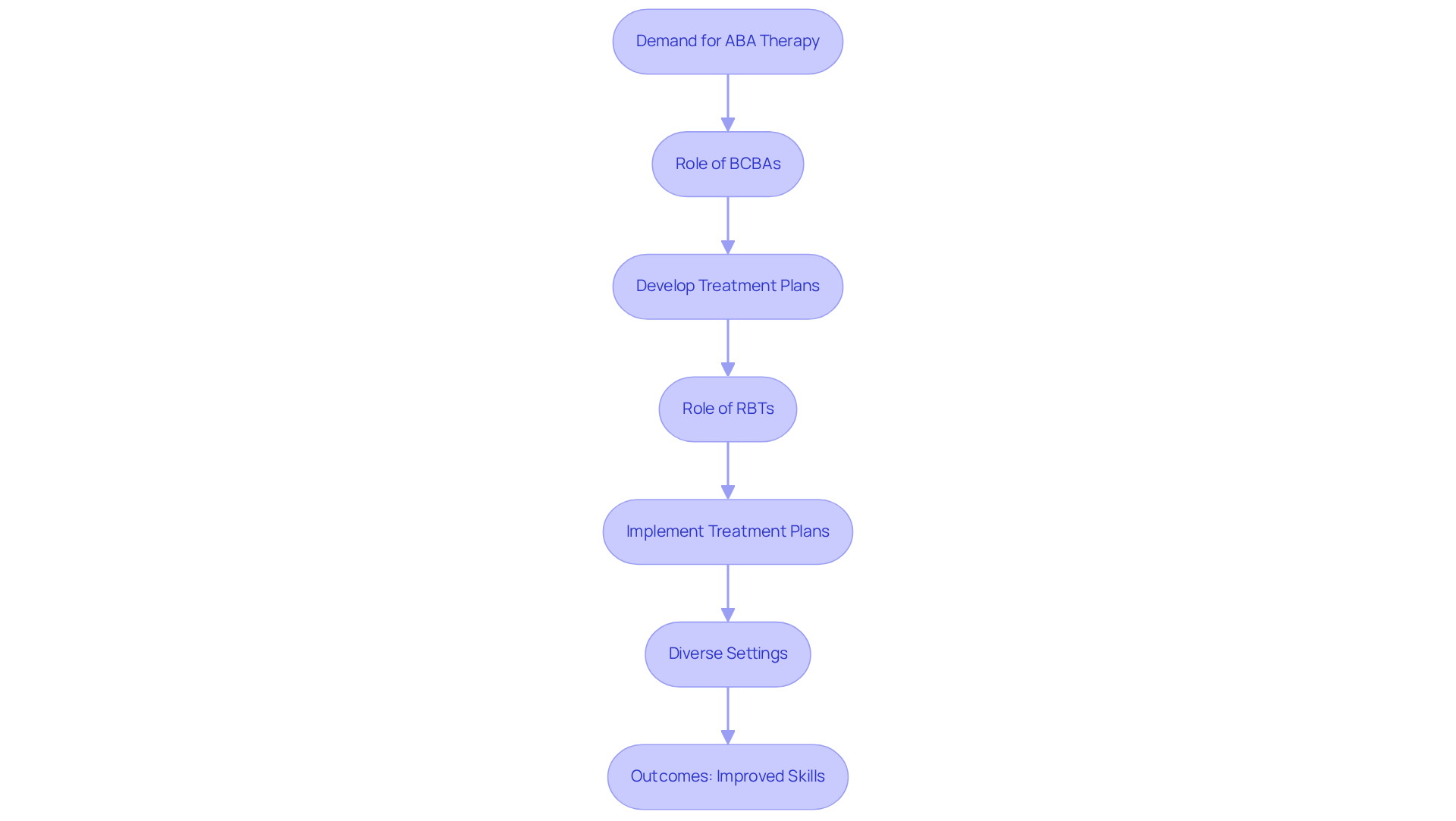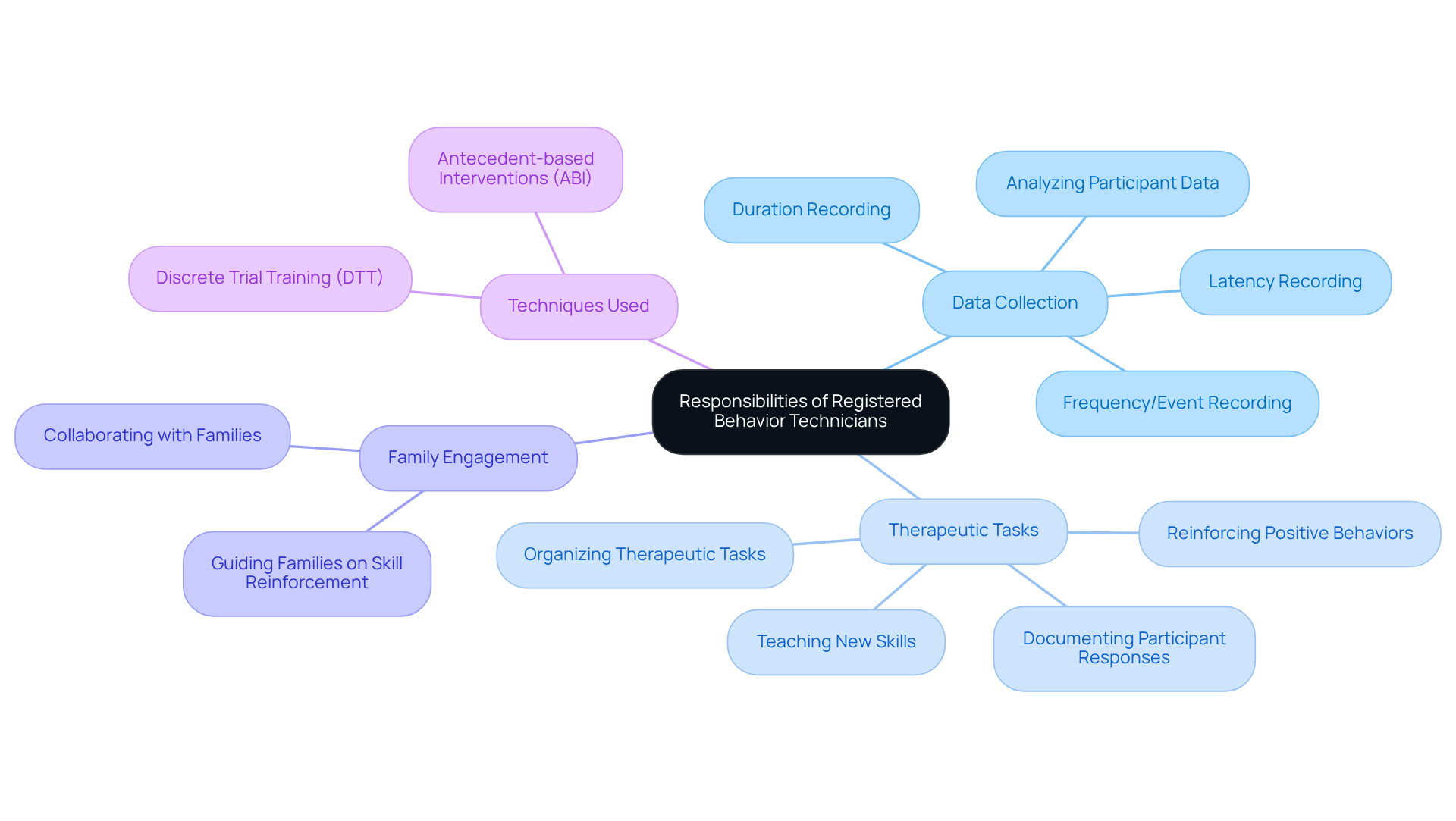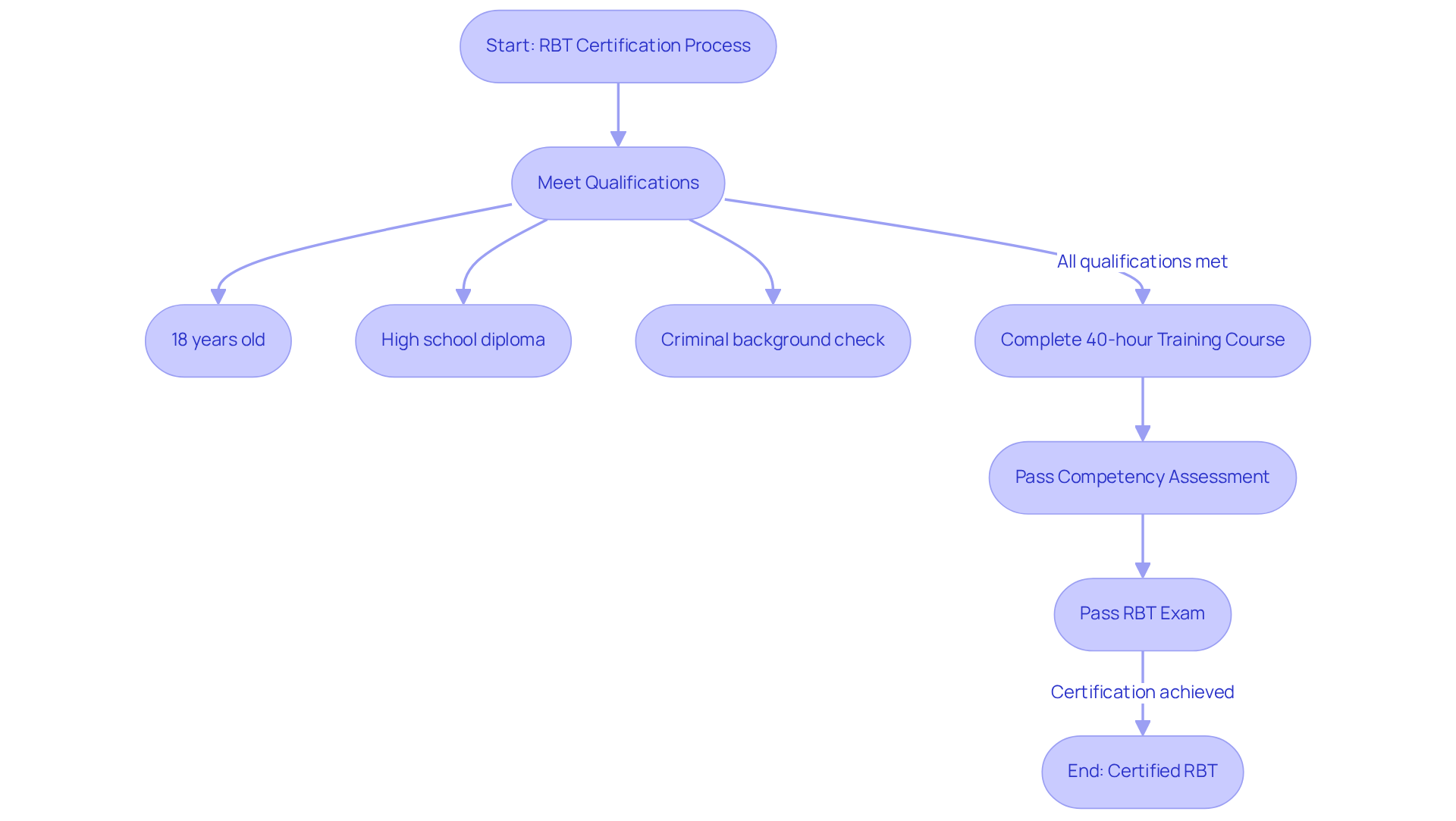October 16, 2025

Registered Behavior Technicians (RBTs) play a pivotal role in Applied Behavior Analysis (ABA) therapy. These professionals are tasked with implementing treatment plans under the supervision of Board Certified Behavior Analysts (BCBAs), specifically to support individuals, particularly those with autism spectrum disorder. The responsibilities of RBTs are extensive and critical, as they directly influence the effectiveness of interventions.
The certification process for RBTs is rigorous, ensuring that only qualified individuals enter this essential field. As the demand for RBTs continues to grow, it becomes increasingly clear that their contributions are vital for improving client outcomes through evidence-based interventions.
Are you facing challenges in hiring qualified RBTs? Consider how utilizing a specialized recruitment platform like Hire ABA can address these pressing needs. With the right support, you can enhance your team's effectiveness and ultimately provide better care for your clients.
In conclusion, the significance of RBTs in ABA therapy cannot be overstated. Their expertise and commitment are crucial for delivering high-quality services, making them indispensable in the field of behavioral health.
The role of Registered Behavior Technicians (RBTs) has emerged as a cornerstone in the landscape of Applied Behavior Analysis (ABA) therapy, particularly in supporting individuals with autism spectrum disorder.
These trained paraprofessionals not only implement intervention plans crafted by Board Certified Behavior Analysts (BCBAs) but also engage directly with clients, fostering essential skills for improved quality of life.
As the demand for RBTs continues to rise, so too do the challenges associated with achieving certification and maintaining high standards of practice.
What does it truly take to excel as an RBT, and why is their contribution vital to the success of ABA therapy?
The answers to these questions are crucial for understanding the impact of RBTs in the therapeutic process.
A registered behavior tech is a trained paraprofessional who plays a vital role in the implementation of Applied Behavior Analysis (ABA) services. Working under the direct supervision of Board Certified Analysts (BCBAs), registered behavior techs are responsible for executing intervention plans designed to enhance the skills and actions of individuals, particularly those diagnosed with autism spectrum disorder (ASD). The RBT certification, overseen by the Behavior Analyst Certification Board (BACB), ensures that registered behavior techs adhere to stringent educational and ethical standards, which are essential for effective practice in the field.
The influence of registered behavior techs in ABA therapy is significant; they are often the primary practitioners who directly engage with individuals, facilitating the application of therapeutic techniques. Case studies indicate that registered behavior techs contribute to improved outcomes for clients by consistently implementing evidence-based strategies and cultivating a supportive environment. As of 2025, the presence of over 112,000 registered behavior techs in the United States underscores the increasing demand for qualified professionals in this sector.
Expert opinions highlight the critical role of registered behavior tech certification in ensuring that practitioners are adequately prepared to deliver high-quality ABA services. Fayge Orzel notes, 'The national average for first-time registered behavior tech exam pass rates has demonstrated a declining trend in recent years,' which underscores the challenges faced by registered behavior technicians in achieving certification. This not only validates the skills of registered behavior techs but also enhances their credibility within the healthcare community, ultimately benefiting the individuals they serve. Furthermore, the job outlook for ABA therapists is projected to increase by 22% from 2019 to 2029, indicating a promising trend for registered behavior techs and ABA professionals. Additionally, the average salary for registered behavior techs typically ranges from $35,000 to $45,000 annually, contingent upon experience and location, making this a viable career path for those interested in the field.

The demand for Board Certified Behavior Analysts (BCBAs) is on the rise, with forecasts suggesting a 19% growth from 2020 to 2030. This surge highlights the essential role of as vital members of the ABA therapy team. Registered behavior techs (RBTs) are primarily responsible for implementing treatment plans designed by BCBAs, providing direct assistance to individuals with autism spectrum disorder (ASD). They play a crucial role in helping those affected develop important skills in communication, social interaction, and daily living activities.
RBTs operate in diverse settings, including residences, educational institutions, and medical facilities. This versatility allows them to tailor their methods to meet the specific needs of each individual. The collaborative relationship between registered behavior techs and BCBAs fosters a consistent and effective intervention strategy, ensuring that clients receive personalized care that addresses their unique challenges.
Consider the case study of a child named Jack. The teamwork between behavior technicians and BCBAs resulted in significant improvements in his language and social skills, demonstrating the effectiveness of this collaboration. As the demand for ABA therapy continues to grow, the importance of RBTs in delivering quality care becomes increasingly clear.
At Hire ABA, we understand the challenges healthcare employers face in finding qualified candidates. Our personalized resume assessments help BCBAs effectively highlight their skills and experiences, ensuring they are matched with roles that align with their career goals. Our streamlined job matching process utilizes advanced job fit scoring to connect BCBAs with ideal positions in the expanding field of ABA therapy. Are you ready to enhance your recruitment strategy? Let Hire ABA be your trusted partner in navigating this growing landscape.

Registered Behavior Techs play an essential role in the successful implementation of behavior intervention plans within ABA therapy. With a , the demand for registered behavior techs is on the rise, underscoring their pivotal role in the therapeutic process. Their responsibilities encompass a range of critical tasks, including:
As emphasized, "Data collection is a vital aspect of the role of a behavioral technician," highlighting its importance in delivering effective therapy.
In addition to providing direct client support, RBTs actively engage with clients' families, offering guidance on how to reinforce skill development at home. This collaboration is crucial for generalizing skills learned during therapy sessions to real-life situations. By ensuring consistent and effective application of interventions, behavior technicians play a significant role in the overall success of ABA therapy programs.
The job outlook for registered behavior techs is promising, with a projected growth rate of 16%, reflecting the increasing demand for their expertise in the field. To become an RBT, individuals must complete a training program and pass a competency assessment, ensuring they are well-prepared to deliver quality care. RBTs employ a variety of techniques, including:
to facilitate learning and progress, further enhancing their effectiveness in supporting individuals receiving ABA therapy.

The demand for registered behavior techs (RBTs) is on the rise, with the U.S. Bureau of Labor Statistics projecting a 9% increase in jobs for psychiatric technicians and aides through 2031, translating to approximately 12,500 newly created positions. To become an RBT, candidates must meet specific qualifications established by the Behavior Analyst Certification Board (BACB). These requirements include:
Candidates are also required to complete a comprehensive 40-hour training course that covers the principles of Applied Behavior Analysis (ABA) and the RBT Task List. This training typically spans 2 to 4 weeks, with many candidates successfully finishing within one to three months. Upon completion, candidates must pass a competency assessment conducted by a qualified professional, followed by the , which consists of 85 multiple-choice questions, including 10 unscored questions used for research purposes. This exam rigorously tests knowledge of ABA principles, ethical considerations, and their practical applications. Candidates have up to eight attempts within a 12-month period to pass the exam if necessary.
Continuous oversight by a Board Certified Behavior Analyst (BCBA) is essential for registered behavior techs, along with adherence to ethical guidelines to maintain certification. This structured approach ensures that registered behavior techs are well-equipped to deliver high-quality services, significantly impacting the lives of individuals with autism and other developmental disabilities. The average salary for a registered behavior tech in the United States is $52,464 per year, underscoring the financial viability of pursuing this career. Are you ready to enhance your organization with qualified RBTs? Consider utilizing Hire ABA for your recruitment needs.

Registered Behavior Technicians (RBTs) are indispensable within the structure of Applied Behavior Analysis (ABA) therapy, directly influencing the quality of care for individuals with autism spectrum disorder (ASD). Their responsibilities include:
All under the supervision of Board Certified Behavior Analysts (BCBAs). The importance of RBTs is highlighted by their rigorous certification process, which ensures they have the requisite knowledge and ethical standards to provide effective therapy.
This article emphasizes critical aspects of RBTs’ responsibilities and qualifications. From implementing treatment plans to engaging with families, RBTs fulfill a multifaceted role that is essential for the success of ABA therapy. The increasing demand for these professionals, as evidenced by job projections and salary ranges, points to a promising career path for those eager to make a meaningful impact in the lives of individuals with developmental disabilities. Furthermore, the collaborative dynamic between RBTs and BCBAs enhances intervention effectiveness, resulting in better outcomes for clients.
Given the rising necessity for qualified RBTs, it is vital to acknowledge their influence on the therapeutic process and the individuals they assist. As the field of ABA therapy evolves, prospective RBTs are urged to pursue the necessary training and certification to make significant contributions to this crucial area of healthcare. The path to becoming a registered behavior technician not only offers a fulfilling career but also plays a pivotal role in fostering a brighter future for individuals with ASD and their families.
What is a Registered Behavior Technician (RBT)?
A Registered Behavior Technician (RBT) is a trained paraprofessional who implements Applied Behavior Analysis (ABA) services under the direct supervision of Board Certified Analysts (BCBAs). They are responsible for executing intervention plans aimed at enhancing the skills and actions of individuals, especially those diagnosed with autism spectrum disorder (ASD).
Who oversees the RBT certification?
The RBT certification is overseen by the Behavior Analyst Certification Board (BACB), which ensures that registered behavior techs meet strict educational and ethical standards necessary for effective practice in the field.
What role do registered behavior techs play in ABA therapy?
Registered behavior techs play a significant role in ABA therapy as they are often the primary practitioners who engage directly with clients, implementing therapeutic techniques and strategies to improve client outcomes.
How many registered behavior techs are there in the United States?
As of 2025, there are over 112,000 registered behavior techs in the United States, reflecting the growing demand for qualified professionals in this sector.
What challenges do RBTs face regarding certification?
RBTs face challenges in achieving certification, as indicated by a declining trend in the national average for first-time exam pass rates in recent years, highlighting the difficulties in the certification process.
What is the job outlook for registered behavior techs and ABA therapists?
The job outlook for ABA therapists, including registered behavior techs, is projected to increase by 22% from 2019 to 2029, indicating a positive trend for professionals in this field.
What is the average salary for registered behavior techs?
The average salary for registered behavior techs typically ranges from $35,000 to $45,000 annually, depending on experience and location.
Our expert recruitment strategies and AI-driven sourcing ensure that you receive top-notch candidates quickly, without compromising on quality. Whether you’re looking for BCBAs, Clinical Directors, or RBTs, we’ve got you covered.